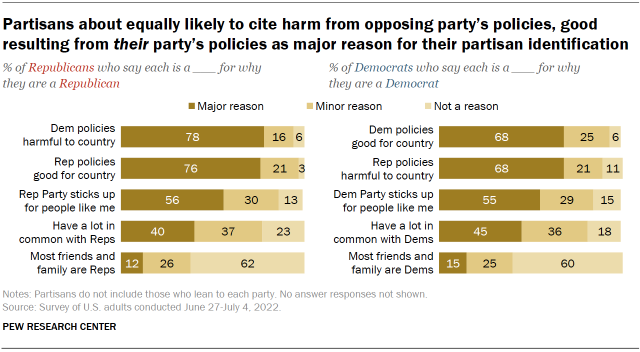Landslide
The conditions required for an unprecedented Tory wipeout are all in place.
A landslide – a type of geological event in which a piece of the Earth suddenly decides it would rather be somewhere downhill of where it currently is – can be caused by many things. Sometimes some force can actively push quantities or soil or rock downwards. At other times, the ground can become too dry or too wet, causing it to lose cohesion and strength. At others, something beneath it gives way.

I’ve not given much thought to the reasons we use “landslide” in the arguably more familiar political sense of the word. A quick scout round the internet suggests it emerged in American politics at some point in the mid 19th century, to refer to an election in which one side “buries” another – that the key thing is the devastation of an unstoppable event for those on the ground. I wonder, though, whether there’s another way of understanding the metaphor. Landslides happen when everything holding a party up disappears.
This is a 2022 survey from the Pew Research Center, concerning the causes of partisanship in the United States. The two big ones can be summarised as “My party is good for the country” and “Their party is bad for the country”; below that come, in order, “My party is good for me”, “My party looks like me” and “Everyone else like me is voting for them”. Some of these reasons are transactional, about policy or outcomes; others are more nebulous, concerning what one might term “values”.
This is about the US, not Britain, of course, and the two are not directly comparable: we have a multi-party system, we are substantially less polarised, those two things may be related. I’d probably also add two more reasons why people may be voting Tory specifically: simple habit, and the frequent lack of an alternative if your politics are on the right. Nonetheless, these categories give us a useful framework for thinking about why the Tory vote share keeps hitting new lows – and suggest reasons to think it may not yet have reached the bottom of the hill.
Much of Labour’s hyper-cautious strategy – its refusal to say or do anything that somebody, somewhere, might see as progressive – can be seen as an attempt to neutralise the “Their party is bad for the country” vote. If centre or centre-right voters aren’t scared of what Keir Starmer and co might do in office, after all, they’re less likely to turn out for the Tories. This is immensely depressing and raises questions about whether the next government will have a mandate for any real change; it also strikes me as unhealthy for a party of the left to spend so much time telling left-wing voters to piss off.
Nonetheless: in narrow electoral terms, it’s clearly worked. In 2019 a significant chunk seriously disliked Boris Johnson – but they disliked Jeremy Corbyn more, so voted Tory to keep Labour out.1 That’s not happening now. They may not vote Labour – but they’ll feel safe to vote for another party, or not vote at all, because they’re not scared of what that’ll mean.
We can probably discount the “My party is good for the country” vote as a huge factor in Tory support at this point: everyone can see the state both country and party are in after 14 years, so this is a case even ministers are struggling to make. The “My party is good for me” vote has propped the Tories up for many years: the government has worked extremely hard to keep a certain core voter (older, socially conservative, home owning, retired) happy. But the cost of living crisis and decline of the NHS have recently made this, too, a much harder sell: to be blunt, almost no one is better off than they were four years ago. On top of that, years of broken promises mean that few are even listening any more: ministers can promise their voters the earth, but many simply won’t believe them.
As to “My party looks like me”, that went out of the window with partygate and Liz Truss. The Tory party stopped being the natural home for a middle England that doesn’t really care about politics: now it’s a bunch of ideological weirdos who spent the pandemic taking the piss. This is one reason Rishi Sunak did himself so much damage by leaving the D-Day commemorations early: he reminded Tory Britain that this Tory party no longer shares their values.
That’s four of the big props for Tory support taken out. As to habit – well, voters have been getting more politically promiscuous for decades, and the party has spent the past year eight years telling its traditional voters in the south that, if they voted Remain, they were no longer welcome. Instead, it focused on northern ex-Labour ones who voted Leave.
For them, though, an alternative just appeared on the horizon in the form of Nigel Farage. Others, in seats like Suffolk, had already realised they could oppose Labour this time by voting Green. Others still will be going LibDem.
That leaves precisely one reason for instinctive Tory voters to turn out and vote Tory: “Everyone else like me is voting for them”. The problem is – they’re not. The under 50s are barely voting Tory at all (the party has done nothing for them, so they’ve never acquired the habit), but this time older ones are not reliably voting Tory either. They’re voting Reform. Or deciding it’s time to give Keir Starmer a chance as he can’t be any worse. Or simply not bothering.
And the more that people stop voting Tory, the less social pressure there is for those left behind to stay. The ground beneath the party is crumbling away.
There are many reasons why people vote for “their” party. But in this election, for many traditional Tories, literally none of the reasons to vote for their party seem to apply. Which is why, where most people can’t hear it, the party is campaigning using a different message entirely:

Perhaps that’ll work: I’m broadly in favour of the idea of a Labour government, and even I am slightly freaking out about the implications of giving one a 200 seat majority. Then again, perhaps it won’t. Landslides – real ones – tend to accelerate. As they pick up momentum, the movement becomes unstoppable.
That might just apply to politics too. Beyond a certain point, a losing campaign seems pointless. Your activists are demotivated. Your voters know the other side is going to win. Why bother knocking on doors? Why bother even voting? Why turn out for a party that you’re as angry with as anyone, when you know they’re going to lose? The worse things get for the Tories, the harder it is to arrest the decline.
Which is why, before this weekend is out, it seems very likely we’ll see a poll which puts the Tories behind Reform.
All the things holding their vote share up have disappeared.
The list
Putting this edition of the gaffe list at the bottom as a treat for those who read to the end:
Obviously the big one is the way Rishi Sunak decided he could just skip out on the D-Day Commemorations to do an interview with ITV that wouldn’t even go out for another six days – a move so insane I got an entire New Statesman column out of it. (“If doing the interview was an attempt to get ‘Sunak lies about Labour tax plans’ out of the headlines, it’s worked. Now we are talking about his disrespect for the war dead.”)
It also led at least one advisor – the stories describe him as “senior”, but they would, wouldn’t they – to quit the party, calling the move “either colossal stupidity or cynical calculation”.
The PM’s first stop after his half-hearted apology, incidentally, was a school whose address was “Veterans Way”. Lol, etc.
In other news, the children’s minister doesn’t know how much child support is.
Penny Mordaunt was the only candidate – of seven – in Friday night’s debate to rack up net negative ratings. Yet voters still prefer her to Rishi Sunak.
The Tory candidate in Spen Valley has quit, “after being exposed for running club nights for kids as young as 13 – sharing a picture showing girls appearing to have the words “horny” and “b***h” on their chests”. Good lord.
And finally: “The country is not stupid.” GP shows up at campaign rally, ruins Rishi’s day.
More – I fear, much more – to come.
Please buy my book
From Amazon, Waterstones, Stanfords, Foyles.
Don’t shoot the messenger, guys.






Did you see in the guardian article about the reaction to Sunak’s DDAy Debacle that they now can’t find enough people to appear at campaign events for the Tories. Noticeable in that footage of the GP reaming Sunak a new one, is how few people they’ve managed to find to stand behind him holding placards. Might as well not bother
I don't disagree with anything said, but I remember very similar articles about The Death of Labour after the 2019 General Election...